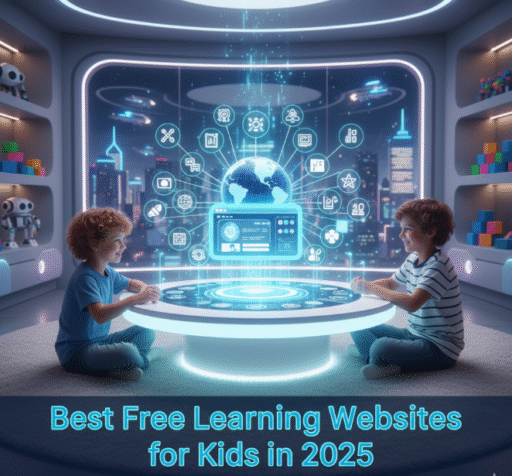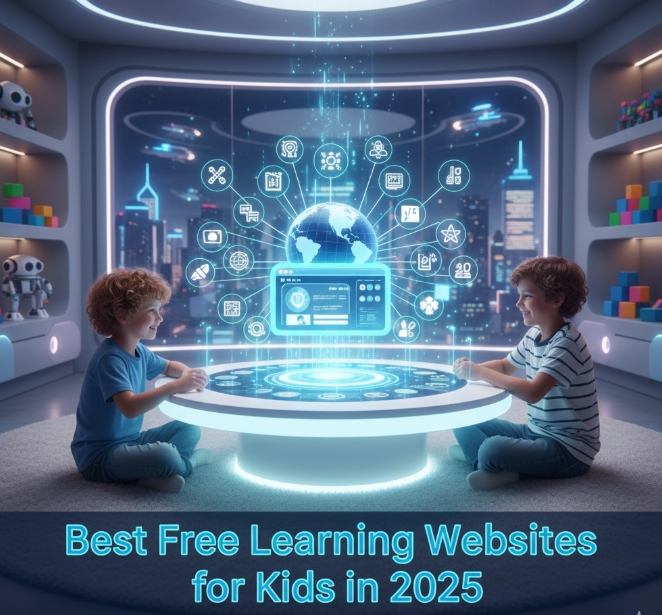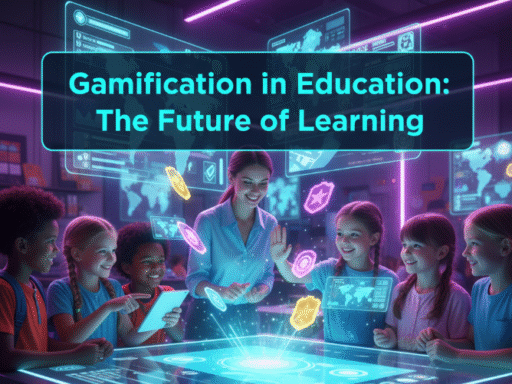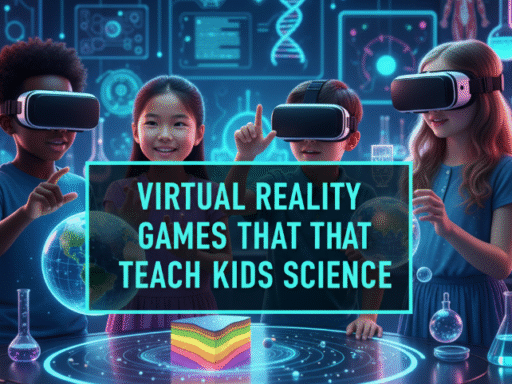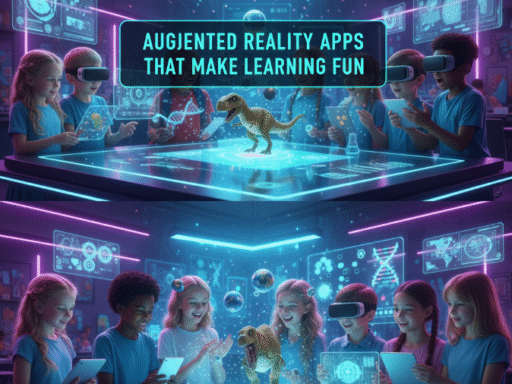Kids learn best when lessons feel like play. In 2025 there are more high-quality, genuinely free websites and apps than ever that teach math, reading, science, coding, and more — without a subscription. This guide walks you through the very best free learning websites for kids, what each one does best, how to use them at home or school, and quick tips to get the most learning in the least time.
Quick note: I put a clear comparison table of the top choices (age ranges, subjects, features). You can open the interactive table shown above titled “Top Free Learning Websites for Kids (2025)” to scan at a glance.
Why choose free learning websites (short and simple)
-
They save money while giving access to high-quality lessons.
-
Many are built by educational nonprofits, public broadcasters, or national organizations — designed by teachers.
-
Kids can learn at their own pace, repeat tricky lessons, and practice with interactive games.
-
Teachers can assign lessons or parents can pick short 10–30 minute activities to fit busy days.
How I picked the sites in this list (quick method)
-
Reputation: well-established nonprofit or education brand.
-
Free access: core content available without payment.
-
Age range: options that work for preschool through middle school.
-
Variety: covers reading, math, science, geography, coding, and creativity.
-
Safe for kids: simple interface, curated content, and (when possible) teacher resources.
Top picks — quick snapshots (each followed by short how-to)
Below I describe the best free sites for specific goals (reading, math, coding, curious explorers, little kids). Each entry includes a short “how to use it in 15–30 minutes.”
Khan Academy — the all-around classroom (K–12, free)
Khan Academy offers thousands of video lessons, practice exercises, and full units across math, science, history, and test prep. It’s one of the largest free learning libraries and includes teacher features like classroom dashboards. Khan Academy
Best for: Structured practice in math and science; older kids preparing for tests.
How to use (15–30 min session):
-
Pick a topic (e.g., fractions or cell structure).
-
Watch a short lesson video (3–10 min).
-
Do the practice problems (5–15 min) to build fluency.
-
Check the hints if stuck — then try a second practice set.
Why parents like it: Clear step-by-step lessons and progress tracking. Khan Academy
Khan Academy Kids (app) — early learners (ages 2–7, free)
This is Khan Academy’s kid-friendly app for preschool and early elementary. It has games, stories, and lessons on early reading, early math, and social-emotional learning. Perfect for short daily practice sessions. Khan Academy
Best for: Preschool and early elementary learners who need engaging, bite-sized lessons.
How to use (10–20 min session):
-
Let the child choose a short game or read-aloud story.
-
Repeat favorite activities to build confidence.
-
Use the app’s suggestions for language and vocabulary practice. Khan Academy
Code.org + Hour of Code — coding for every kid (K–12, free)
Code.org has a full K–12 curriculum and the famous Hour of Code activities. Interactive, drag-and-drop coding lessons introduce programming and simple AI concepts using games and well-known characters. Code.org+1
Best for: Kids who want to try coding, teachers introducing computing, quick one-hour lessons.
How to use (30–60 min session):
-
Choose an Hour of Code tutorial (Minecraft, music, or simple puzzles).
-
Follow the step-by-step drag-and-drop tasks.
-
Share the finished project or repeat with a different tutorial. Code.org
Scratch (MIT) — creative coding and storytelling (ages 7+, free)
Scratch is a block-based coding site where kids create games, animations, and stories. It’s also a friendly community where children can show projects and remix others’ work. Great for creativity and computational thinking. Scratch
Best for: Creative projects, early programming concepts, game design.
How to use (30–60 min session):
-
Start with a “Create” tutorial or remix a project.
-
Encourage kids to add a new sprite or change the background.
-
Save and share the project for friends or class review. Scratch
PBS KIDS — game-based learning tied to shows (pre-K–Grade 3/4, free)
PBS KIDS pairs familiar show characters with educational games across reading, math, and science — ideal for younger school-age children. The site has many short, safe games built around curricular goals. PBS KIDS+1
Best for: Preschool and early elementary kids who respond to familiar TV characters.
How to use (10–25 min session):
-
Choose a game that matches a learning goal (e.g., reading or counting).
-
Play together the first few rounds; then let the child play independently.
-
Ask a 1–2 question follow-up about what they learned. PBS KIDS
BBC Bitesize — short lessons and revision (primary & secondary, free)
BBC Bitesize provides short lessons, videos, and quizzes aligned with UK curricula, and it’s useful for kids who like bite-sized lessons and quick tests. OurTime
Best for: Short, curriculum-aligned lessons and practice quizzes.
How to use (15–30 min session):
-
Pick a topic and read or watch the short explainer.
-
Try the quick quiz for immediate feedback. OurTime
National Geographic Kids — science and wonder (ages 6–12, many free resources)
If your child loves animals, planets, or geography, National Geographic Kids has quizzes, videos, and “Weird But True” facts to spark curiosity. It’s great for project-based learning and short science lessons. National Geographic+1
Best for: Curious scientists and nature lovers.
How to use (10–30 min session):
-
Pick a “Weird But True” fact or animal page.
-
Watch a short video and then ask a few research questions.
-
Use the site’s printable resources for a small hands-on project. National Geographic
Other strong free options worth trying
-
CK-12 — free interactive textbooks and practice for K–12 science and math.
-
Funbrain — games and ebooks for Pre-K through Grade 8.
-
Starfall — early reading and phonics with free core content.
(Each is family-friendly and widely used by teachers and parents.)
Which site should you pick for your child? (Quick decision guide)
If your child is 2–7: Start with Khan Academy Kids or Starfall. Short, playful sessions help build vocabulary and phonics.
If your child is 7–11: Try Scratch (creative coding), National Geographic Kids (science), and PBS KIDS games.
If your child is 11–14: Use Khan Academy for math/science and Code.org for deeper computer science units.
If you want curriculum-style revision: BBC Bitesize and Khan Academy are strong picks.
Daily routine examples (easy schedules)
Here are three short routines you can use on school days or weekends.
Option A — Quick 20-minute after-school (ages 8–12):
-
5 min — Read a short article/video on National Geographic Kids.
-
10 min — Practice a Khan Academy lesson (math practice).
-
5 min — Play a PBS KIDS reading game to finish.
Option B — 40-minute project session (ages 9–14):
-
10 min — Code.org Hour of Code module (coding practice).
-
20 min — Scratch: build or remix a small game.
-
10 min — Reflect: write 3 sentences about what was learned.
Option C — Preschool daily pick (ages 3–6):
-
15 min Khan Academy Kids story + guided talk about pictures.
Safety and screen-time tips (short checklist)
-
Use parent/teacher mode where available.
-
Schedule short sessions (10–30 minutes) and take breaks.
-
Supervise younger kids and talk about what they learned.
-
Turn off autoplay and restrict comments/sharing for very young users (if the platform has social features).
-
Balance screen lessons with drawing, reading physical books, or outdoor play.
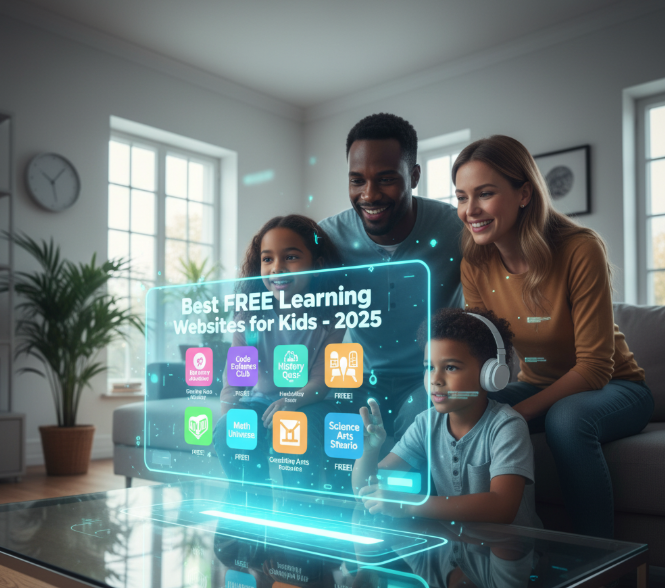
Best Free Learning Websites for Kids in 2025
Free vs Freemium — what to watch for
Some sites are fully free (Khan Academy, Code.org, Scratch, PBS KIDS, BBC Bitesize). Others offer a generous free tier but also paid extras (e.g., extra features, ad-free experience, or teacher packs). Always check the site’s pricing page and look for child-safe, ad-free guarantees if you’re concerned.
Table you can use in class or at home
(If you didn’t already open it, the interactive table above lists the websites, age ranges, subjects, and notable features so you can compare at a glance.)
Short comparisons — quick bullets for parents (fast scan)
Best for deep practice: Khan Academy — lessons + practice problems. Khan Academy
Best for coding beginners: Code.org + Scratch — structured tutorials and creative projects. Code.org+1
Best for very young kids: Khan Academy Kids and Starfall — playful early literacy and math. Khan Academy
Best for curious explorers: National Geographic Kids — science, animals, and geography. National Geographic
Best for TV-character learning: PBS KIDS — short, familiar, game-based learning. PBS KIDS
Best short lesson bank: BBC Bitesize — bite-sized curriculum-aligned lessons. OurTime
Classroom uses and teacher tips
-
Assign short Khan Academy units for homework and check progress in dashboards. (Khan has teacher tools.) Khan Academy
-
Run an Hour of Code day with Code.org activities — one lesson gives all students a fun coding win. Code.org
-
Use Scratch projects for final assessments: let students submit a short game or interactive story as a creative assessment. Scratch
-
Print National Geographic resources for offline research and hands-on projects. National Geographic Kids
Sample weekly plan (simple, easy to follow)
Monday — Reading + Science
-
20 min Khan Academy reading or PBS reading game.
-
15 min National Geographic Kids video + short fact sheet.
Wednesday — Math and coding
-
25 min Khan Academy math practice.
-
20 min Code.org Hour of Code.
Friday — Creative project
-
30–40 min Scratch project or remix.
Frequently asked questions (short answers)
Q: Are these websites really free?
A: The core content of Khan Academy, Code.org, Scratch, PBS KIDS, BBC Bitesize, and National Geographic Kids is free. Some platforms offer optional paid extras, but the learning content listed here is accessible at no cost. National Geographic+5Khan Academy+5Code.org+5
Q: Will my child see ads on these sites?
A: Reputable nonprofit or public broadcaster sites (Khan Academy, Code.org, PBS KIDS, BBC Bitesize) minimize or remove commercial ads in kids’ content. Always check site-specific policies. Khan Academy+2Code.org+2
Q: What if my child gets stuck?
A: Choose sites with hints (Khan Academy has step hints) or try pairing practice with a short parent-led explanation. For coding, let them copy a working project and then tweak one detail to learn safely. Khan Academy+1
Quick parent checklist to start today
-
Choose one site for reading and one for math.
-
Schedule 2–3 short sessions this week (10–30 min each).
-
Bookmark the site on your child’s device and enable child-safe mode if available.
-
Encourage sharing: ask your child to show you one new thing they learned.
-
Celebrate progress, not perfection!
Final thoughts — make learning playful and steady
Free learning websites in 2025 are powerful tools. They’re not a replacement for caring teachers or curious play — they’re a safe, structured place to practice, explore, and create. Start small, combine one or two sites, and let curiosity lead — kids will follow.
Sources & trusted homepages (useful links)
-
Khan Academy (main site) — official site with lessons and practice. Khan Academy
-
Khan Academy Kids (early learning app) — free app for preschool and early elementary. Khan Academy
-
Code.org — Hour of Code and free K–12 CS curriculum. Code.org+1
-
PBS KIDS — educational games and videos for young children. PBS KIDS+1
-
BBC Bitesize — bite-sized lessons and quizzes. OurTime
-
Scratch (MIT) — creative coding and project sharing. Scratch
-
National Geographic Kids — science and geography resources for kids. National Geographic+1
